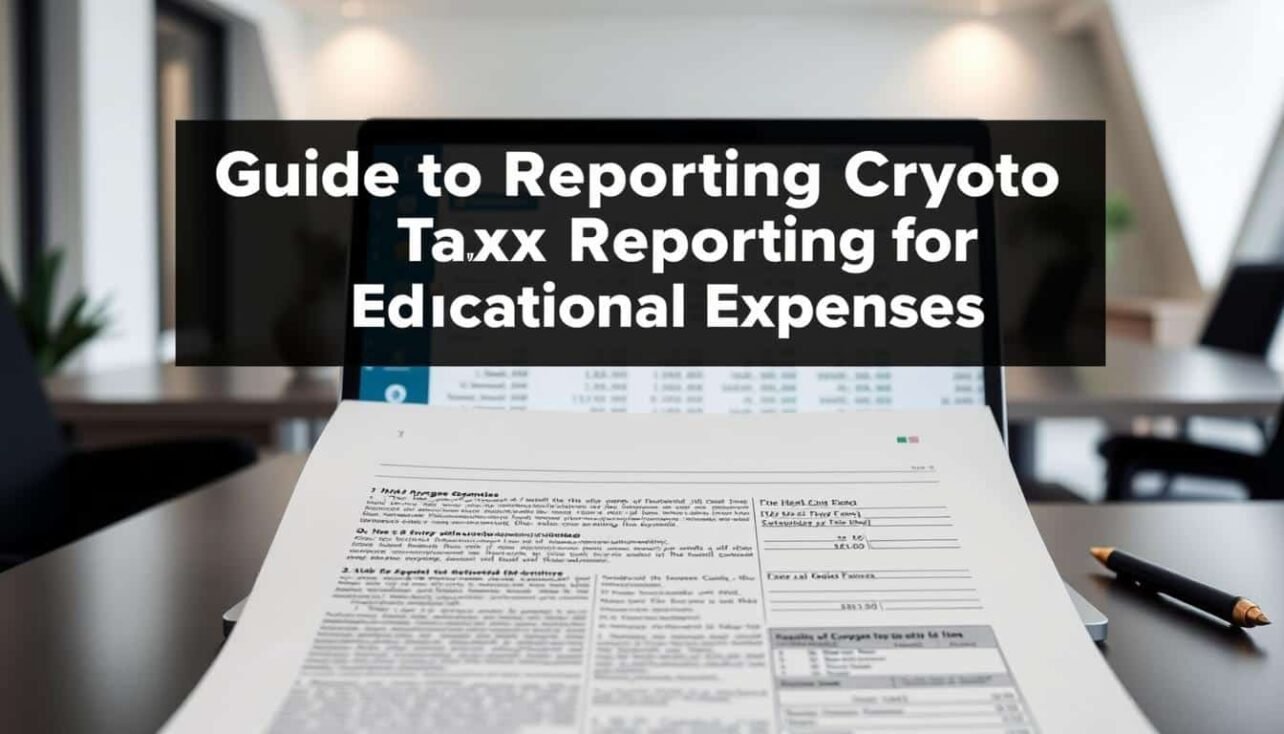When it comes to crypto tax for education, knowing the rules is key to avoid fines. With more people using Bitcoin or Ethereum for school costs, it’s important to understand the tax implications. The IRS views crypto as property, so every transaction can affect your taxes.
This guide will help you report crypto used for school costs. You’ll learn how to spot taxable events, keep track of transactions, and use tax credits like the American Opportunity Credit. Remember, keeping good records and calculating cost basis correctly is crucial for following the law.
Key Takeaways
- Crypto payments for education trigger tax reporting under IRS virtual currency tax rules.
- Failure to report crypto transactions could lead to audits or fines.
- Qualified educational expenses include tuition, books, and supplies but exclude room and board.
- Forms like Form 8949 and Schedule D are required for accurate reporting.
- Staying informed on state and federal crypto tax policies reduces compliance risks.
Understanding Cryptocurrency Taxation Basics
Managing blockchain tax implications begins with understanding the basics. The IRS views cryptocurrency as property, as stated in Notice 2014-21. This means every transaction with crypto can have tax effects.
How the IRS Classifies Cryptocurrency
Crypto assets are taxed like stocks or real estate. Using crypto for tuition payments is a taxable event. The IRS requires tracking cost basis and gains, even for direct payments to schools. Not reporting these transactions can lead to penalties.
Capital Gains vs. Ordinary Income for Crypto
- Holding crypto less than a year? Profits are short-term capital gains taxed at income tax rates.
- Hold for over a year? Long-term capital gains rates apply, often lowering tax burdens.
- Income from mining or airdrops? Treated as ordinary income, not capital gains.
Tax Events Triggered by Crypto Transactions
Every crypto action can trigger taxes. Examples include:
- Selling crypto to fund tuition payments
- Transferring crypto directly to a university account
- Swapping one cryptocurrency for another before paying educational fees
Each action creates a taxable event that needs documentation. Knowing these rules helps avoid virtual currency tax rules compliance issues.
Qualified Educational Expenses Under IRS Guidelines
When you claim education expenses deductions, following IRS guidelines is key. These rules help decide which costs qualify for tax breaks. This is especially important when using cryptocurrency for school payments. Here are the main criteria for what’s allowed and what’s not.
Tuition and Related Fees
Eligible tuition includes fees from accredited schools. This includes lab fees, enrollment deposits, and special program charges. But, student activity fees or travel costs don’t count. You must keep proof of these fees to show they’re for enrollment.
Required Books and Supplies
Required course materials are eligible for deductions. For example, a chemistry book or safety goggles needed for class. But, optional study materials or general office supplies don’t meet IRS standards.
Room and Board Considerations
Lodging costs are only for students taking at least half-time on-campus classes. Dorm costs might qualify under IRS rules. But, off-campus housing and meal plans usually don’t qualify.
Non-Qualifying Educational Expenses
- Transportation costs (gas, public transit)
- Health insurance premiums
- Electronics not course-specific (e.g., personal laptops)
- Membership fees for gyms or clubs
These costs can’t be claimed as education expenses. Always check IRS Publication 970 for the latest details.
Crypto Tax Reporting for Educational Expenses: Key Requirements
Following IRS rules for crypto tax reporting for educational expenses is crucial. You must keep records of all crypto transactions for tuition, books, or fees. From January 2025, exchanges will send Form 1099-DA. This form tracks each wallet under new virtual currency tax rules.
Taxpayers need to report gains and losses on Form 8949. Then, they transfer these totals to Schedule D.

On Form 1040, you must answer if you received, sold, sent, or exchanged any virtual currency. Payments for education made with crypto are taxed based on the asset’s value at the time of the transaction. Important details to track include:
- Date and cost basis of crypto purchased
- Educational institution receipts
- Transaction IDs linking crypto sales to tuition payments
Reporting rules change based on who owns the crypto. If parents or students use their own wallets, they must report separately. Even if schools accept digital assets, direct payments still need Form 8949.
Selling Bitcoin for tuition is taxable. But direct transfers might also have capital gains.
Mistakes in following virtual currency tax rules can lead to penalties. Check the IRS guidance on crypto tax reporting for more information. Keeping digital wallet statements and transaction records organized helps avoid errors and audit risks. Make sure Form 1099-DA data matches your records starting 2025.
How Educational Tax Benefits Interact with Cryptocurrency
Understanding student tax benefits means linking crypto deals with IRS education credits. Selling crypto for tuition might lead to capital gains. But, with smart planning, students can save on taxes. New laws change deductions, so keeping records is key to not losing credits.
American Opportunity Credit and Crypto
The American Opportunity Credit can give up to $2,500 a year for eligible student costs. If you sell crypto to pay for tuition, report the gain. But, you can still get the credit if the money goes straight to qualified expenses. Make sure to document both the crypto sale and tuition payment dates.
Lifetime Learning Credit Considerations
The $2,000 Lifetime Learning Credit helps with courses that boost job skills. If you use crypto for these expenses, it might qualify. Just make sure the crypto sale and course start dates match. Keep records of both to claim the credit right.
Tuition and Fees Deduction Options
After 2017, the federal tuition deduction ended. But, some states still offer deductions for crypto-paid tuition. Check your state’s rules to see if crypto sales qualify for these programs.
- Time crypto sales profits to match tuition deadlines.
- Use free crypto earning methods to build funds without upfront costs.
- Consult a tax advisor to align crypto gains with education expense timing.
To get the most from student tax benefits, track crypto sales and education expenses closely. Matching crypto reports with credit claims helps avoid trouble. It also helps save money for students’ finances.
Calculating Cost Basis for Crypto Used on Education
Getting the cost basis right is key for Crypto tax reporting for educational expenses. The IRS wants you to keep track of when and how much you paid for each cryptocurrency. This helps figure out if you made a profit or loss.
- FIFO (First-In, First-Out): Uses oldest crypto purchases as the first sold.
- LIFO (Last-In, First-Out): Applies newest purchases first.
- Specific Identification: Explicitly selects specific coins’ purchase details for each transaction.
Let’s say you bought 1 BTC for $30,000 in 2021 and 0.5 BTC for $60,000 in 2023. If you sell 0.75 BTC for tuition, you need to know the cost basis. Using specific identification for the 2021 coins can lower your taxable gains compared to LIFO.
Crypto received as gifts, mined, or via airdrops has its own rules. Gifts get the giver’s basis, and mined crypto starts at its market value at mining time. Not tracking these details can make your cryptocurrency tax deductibles claims invalid.
Keep a record of every transaction with ledger software or IRS-approved tools. Save records of purchase dates, amounts, and fees. Wrong cost basis calculations are a major reason for audits in educational expense reporting.
Record-Keeping Essentials for Crypto Educational Payments
To report crypto taxes for education, you need to keep accurate records. These records prove your transactions follow IRS rules. Without them, claiming tax benefits for education is risky. Here’s how to keep compliant records.
Transaction Documentation Requirements
Keep track of every crypto transfer for education. You should have records that show:
- Date and time of each transaction
- Crypto type and quantity sent/received
- Sender and recipient wallet addresses
- Fair market value (in USD) at transaction time
Educational Institution Receipts
Get detailed receipts from schools for tuition payments. You’ll need forms like 1098-T to show tuition costs. Keep itemized bills to separate education costs from other expenses.
Scan and date-stamp all physical receipts. This helps keep your records organized.
Digital Wallet Statement Organization
Use tools like CoinTracker or CryptoTaxTool to tag crypto transfers. Create labeled folders in your wallet for education funds. Note when crypto was sold for tuition.
Match wallet logs with school invoices to show direct payments. This proves your transactions are for education.
Keep records for at least six years. IRS audits can happen three years after you file. Good records help you claim deductions and avoid penalties. Store both paper and digital files in a dedicated folder for easy access during tax time.
Form 8949 and Schedule D: Reporting Crypto Sales for Tuition
When it comes to crypto tax reporting for educational expenses, you need to fill out Form 8949 and Schedule D carefully. The IRS has rules for reporting educational expenses. This part explains how to report your crypto sales for tuition to avoid trouble with the IRS.
Line-by-Line Guidance for Form 8949
Every crypto sale for tuition must be listed separately. Important fields include:
- Date columns (A): Write down the exact dates of purchase and sale to figure out how long you held it.
- Description (Column B): Write “college tuition” or “book purchases” to show it’s for education.
- Proceeds (Column D): List the USD value you got from selling crypto for tuition.
- Basis (Column F): Put in the original cost basis using IRS-approved methods like FIFO or specific identification.
Transferring Information to Schedule D
Sum up all gains/losses from Form 8949 on Schedule D. Educational crypto sales are mixed with other capital gains. But, make sure to note their educational use. The Short-Term/Gains/Losses sections need to add up all transactions, including educational ones.
Common Reporting Errors to Avoid
- Not mentioning “educational purpose” in transaction descriptions.
- Getting the holding periods wrong for cost basis calculations.
- Not checking the virtual currency box on Form 1040.
- Mixing short-term crypto sales with long-term gains from other assets.
Making mistakes can lead to audits. Always check the IRS guidelines for educational expenses before you finish your forms.
Tax Implications of Scholarships and Crypto
Students getting scholarships need to know how crypto affects their student tax benefits. Scholarships for tuition, fees, or supplies are usually tax-free. But, money for room and board or personal stuff might be taxed.
When scholarships come in crypto, their value at the time you get them counts as income. This can change how you file your taxes.
Using crypto for education costs not covered by scholarships can lead to tax savings for students. For instance, if a scholarship pays for tuition but not lab fees, using crypto for those fees might lower your taxable income. Grants for sports or research in crypto also need careful tracking. Only the expenses that qualify as education costs are tax-free.
- Scholarship income in crypto is taxed at receipt based on its value
- Expenses paid with crypto outside scholarships may trigger capital gains
- Allocate crypto transactions to non-covered expenses first to maximize savings
Athletes or researchers with crypto grants must report any extra money as income. Work-study earnings in crypto are taxed like regular income. To get the most out of student tax benefits, keep records of how crypto payments match up with allowed expenses. Check IRS Publication 970 for scholarship tax rules and IRS Notice 2014-21 for crypto guidance.
State Tax Considerations for Crypto Educational Expenses
Using cryptocurrency for school expenses adds complexity due to state tax rules. Residents need to check if their state offers tax savings for students or allows education expenses deductions for crypto payments. Each state has its own rules, creating both chances and challenges.

States with Favorable Crypto Tax Policies
- Texas, Florida, and Wyoming: No state income tax, so crypto used for tuition avoids state-level capital gains taxes.
- Arizona and South Carolina: No sales tax, simplifying crypto-to-school payments.
- States like Ohio: Explicitly exclude crypto from state reporting if used for qualified education expenses.
High-Tax States to Be Aware Of
California and New York require reporting crypto gains even for educational payments. Residents here may face double taxation if state rules differ from federal guidance on education expenses deductions. Always compare state deadlines and forms like California’s FTB 3522.
State-Specific Educational Credits
Some states offer unique breaks. Oregon’s College Savings Plan tax credit applies to crypto contributions. New York’s Tuition Tax Credit can offset crypto-related income. Verify if state credits reduce taxable crypto gains differently than federal rules. Residents in multi-state scenarios (e.g., parents in one state, student in another) must file in both jurisdictions if crypto funds cross borders.
Using Tax Software for Crypto Education Expense Reporting
Managing crypto tax reporting for educational expenses needs special tools. Platforms like TurboTax, H&R Block, and TaxAct have crypto modules. But, how they handle education expenses differs. For instance, CryptoTrader.Tax helps track the cost basis of crypto used for tuition.
- TurboTax: Imports crypto transactions but needs manual entry for cryptocurrency tax deductibles related to school payments.
- CryptoTrader.Tax: Automatically connects crypto sales to tuition invoices, making Form 8949 easier.
- H&R Block: Provides crypto guides but lacks tools for direct educational expense categorization.
Look for software with receipt scanning and multiyear tracking. Features like automatic IRS form syncing help avoid mistakes. For example, TaxAct’s “expense tagging” lets users mark crypto payments as educational. Make sure the software is updated for 2023 IRS crypto rules.
- First, import crypto transaction data and then map expenses to educational categories.
- Use “deduction labels” to mark eligible payments like tuition or books.
- Export reports for audits, ensuring clear distinction between crypto sales and school payments.
DIY filers should check if their software can calculate educational credits. Cases involving many crypto types or international transactions might need a pro. Always compare software “what-if” tools to get the most tax benefits.
When to Consult a Crypto-Savvy Tax Professional
Understanding virtual currency tax rules and blockchain tax implications can be tricky, especially when it comes to crypto funds for education. Certain situations require the help of an expert to avoid penalties or miss out on savings.
Red Flags That Require Expert Assistance
- Large crypto transactions exceeding $10,000 in value
- Significant gains triggering capital gains taxes
- Use of international exchanges or foreign crypto platforms
- Engaging in crypto mining or staking during studies
- Educational payments spread across multiple tax years
- Receiving scholarships paid in cryptocurrency
Finding Qualified Crypto Tax Specialists
Look for professionals with:
- Certifications like CPA or Enrolled Agent status
- Experience handling blockchain tax implications for educational expenses
- References from clients with similar crypto-education cases
Ask them about their method for reporting crypto-based tuition payments on IRS Form 8949.
Cost-Benefit Analysis of Professional Help
Fees can range from $500 to $3,000, depending on the complexity. Consider the costs against the risks:
- Penalties for unreported crypto gains average 20-30% of unpaid taxes
- Specialists prevent missed education tax credits worth thousands
- Early planning reduces emergency audit costs
Timeline for Reporting Educational Crypto Transactions
Following college tuition deductions and virtual currency tax rules means having a yearly plan. Here’s how to match crypto transactions with education funding and tax deadlines:

- January-February: Keep track of tuition bills and academic schedules. Note crypto sales dates to match tuition deadlines while minimizing tax impact.
- March-April: Gather 1099-K or exchange reports for crypto transactions. Update digital wallet records to document educational payments.
- May-June: Review academic year expenses. Calculate gains/losses from crypto used for tuition by June 30 to prepare for fall filings.
- September-October: Confirm final tuition payments. Retain receipts for college tuition deductions and crypto transaction logs.
- November-December: File Form 8949 by tax deadline. Report crypto gains/losses on Schedule D while claiming education credits.
Time crypto sales to align with tuition due dates. File extensions by October 15 if needed, but keep crypto records updated year-round. Missing deadlines could delay college tuition deductions or trigger IRS scrutiny under virtual currency tax rules.
Use academic semesters as benchmarks. For example, selling crypto in August avoids end-of-year price volatility while meeting fall tuition deadlines. Pair crypto gains with education expenses to maximize deductions and minimize taxes.
Audit Risk Factors When Using Crypto for Education
Crypto is becoming more popular for paying for education. But, the IRS is watching closely because of blockchain tax issues. It’s very important to follow IRS rules for education expenses to avoid audits.
If you don’t track your crypto transactions for tuition or supplies, you might face an investigation.
IRS Enforcement Priorities
The IRS is cracking down on crypto users who don’t report their gains. They look for any crypto sales that don’t match up with education deductions. The main areas they focus on are:
- Unreported crypto-to-education payments
- Lack of proof linking crypto sales to school costs
- Discrepancies between Form 8949 and tuition records
Documentation That Reduces Risk
Keep detailed records of how your crypto was used for education. You’ll need:
- Crypto transaction logs with dates and amounts
- School invoices showing crypto payments for fees
- Bank statements proving crypto sale proceeds went to education
It’s important to have a clear trail showing how crypto sales were used for IRS-approved education expenses.
Responding to IRS Inquiries
If the IRS contacts you, provide all your documents right away. Show how your crypto sales were for education costs. To deal with penalties, you can:
- Ask for penalty abatement if it was a mistake
- Use Form 1040-X to correct errors
- Get help from experts for complex cases
A 2023 IRS study showed 78% of crypto education cases were due to missing documents. Keeping good records helps avoid risks and ensures you follow the rules.
Case Study: Successfully Reporting Bitcoin Used for College Tuition
The Johnson family used Bitcoin to pay their daughter’s tuition. They had to deal with college tuition deductions and cryptocurrency tax deductibles. They planned carefully over three years. Here’s how they made it work:
- Year 1: Bought $25,000 Bitcoin, held for over a year (long-term gains)
- Year 2: Sold Bitcoin to cover tuition, tracked cost basis via CoinTracker
- Year 3: Filed Form 8949, reporting $3,000 gain taxed at 15% capital gains rate
They kept records of every transaction. They used school receipts and wallet logs. By claiming college tuition deductions, they cut their taxable income by $4,000 each year. A tax expert helped with cryptocurrency tax deductibles and the Lifetime Learning Credit. Their detailed records passed the audit.
They made a few mistakes. Forgetting a 2019 transaction date cost them $200. They learned to log trades right away and keep tuition invoices with blockchain confirmations. Their strategy saved them $12,000 in taxes over three years. It shows using crypto for education can be done right if you track it well.
Moving Forward: Staying Compliant in the Evolving Crypto Tax Landscape
Cryptocurrency is becoming more popular, and so are the tax rules. People using crypto for school need to keep up with these changes. New technologies and trends might make tax rules even more complex.
It’s important to stay updated. Watch for IRS news on crypto taxes and read tax journals. Use tools like TurboTax to track your crypto. IRS Publication 550 can help with educational deductions.
Keeping detailed records is key. Show how each crypto transaction is for education. This helps with education expenses deductions. Blockchain can help with audits, but you need good records too.
Plan ahead to avoid problems. Follow new laws and state policies on crypto for school. Whether it’s Bitcoin for tuition or stablecoins for supplies, follow the basics. The future of crypto in education depends on being accurate with taxes.
FAQ
What is crypto tax reporting for educational expenses?
Crypto tax reporting for education means tracking and reporting any crypto used for school payments. It’s key for those using digital assets for tuition and other school costs to follow IRS rules to avoid fines.
Can I use cryptocurrency to pay for qualified educational expenses?
Yes, you can use crypto for school costs like tuition and books if the school accepts it. But, you might face tax issues based on IRS rules about digital currency.
What are some cryptocurrency tax deductibles related to education?
Some school costs, like tuition and fees, might be deductible. But, not all expenses qualify, like personal items bought with crypto. IRS rules set the limits.
How do I determine if my educational expenses qualify for tax benefits?
Check the IRS guidelines on qualified school expenses. Only specific costs like tuition and books are eligible. Keep records to prove these costs were for school.
What forms do I need to report cryptocurrency used for educational expenses?
You’ll need Form 8949 for each transaction, Schedule D for capital gains, and possibly Form 1040 Schedule 1, depending on your situation.
Are there any tax credits available for educational expenses funded by cryptocurrency?
Yes, you might still get tax credits like the American Opportunity Tax Credit and the Lifetime Learning Credit, even with crypto. But, you must document your expenses and meet the criteria.
How can I calculate the cost basis of cryptocurrency used for education?
You can use IRS-approved methods like FIFO or LIFO to calculate your cost basis. Knowing this is key for accurate reporting of gains or losses from crypto used for school.
What documentation should I keep for crypto educational payments?
Keep detailed records of transaction dates, amounts, and digital wallet statements. Also, have receipts from schools to back up your tax claims.
How do state tax considerations affect my cryptocurrency transactions for education?
State taxes on crypto can vary a lot. Some states are more favorable, while others have high rates. Knowing your state’s tax rules is important for your tax strategy.
When should I consult a tax professional about my crypto and education finances?
If your crypto and school payments get complicated, like with many transactions or scholarships, it’s time to talk to a tax expert. They should know about crypto and education tax benefits.


No comments yet